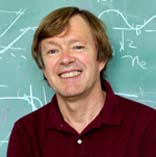2008 Excellence in Research Prize and Medal Recipient

March 28, 2008
Philip R. Goode, PhD, distinguished professor of physics at NJIT and director of the Center for Solar-Terrestrial Research is leading the project to build the world’s most capable solar telescope at Big Bear Solar Observatory (BBSO), Big Bear Lake, California. Goode has been director of BBSO since NJIT took over the facility from California Institute of Technology in 1997. Cal Tech developed the site in 1969.
BBSO’s new solar telescope will be a 1.6-meter clear aperture, off-axis telescope featuring the world’s largest solar aperture. Spring of 2008 has been slated to bring first light. The telescope will feed the high-order adaptive optics system, which in turn will feed the next generation of technologies for measuring magnetic fields and dynamic events using visible AND infrared light. The new instrument also features a parallel computer system for real-time image enhancement.
Goode has years of experience studying sun’s atmosphere (called helioseismology) in addition to his studies of magnetic fields. Goode is expert at combining BBSO ground-based data with satellite data to determine dynamic properties of the solar magnetic fields. His other areas of interest include working to place a lower limit on solar irradiance and to probe the solar interior. Such studies bear greatly on scientists’ understanding and ability to predict “space weather.”
In recent years, industry, government and scientists have begun placing increasing attention upon space weather to learn more about which solar magnetic storms can have deleterious effects on satellites, the terrestrial power grid and telecommunications. Since 1998, Goode’s research has also focused on climate studies in which the Earth’s large-scale reflectance has been measured using the earthshine. He and BBSO researchers have also spent time modeling the Earth’s reflectivity using satellite cloud cover and found appreciable decadal variation of reflectance due to cloud changes. BBSO is building a global network to measure the Earth’s global reflectance and spectrum.
In fall 2007, Goode received the NJIT Excellence in Research Award from NJIT’s College of Science and Liberal Arts. He also recently received the university’s first NJIT Board of Overseers Award. The awards were presented in recognition of a sustained record of contributions that have enhanced NJIT’s reputation.
Goode has played a major role increasing the strength of the university’s solar physics program, which has trained 24 current and past post-doctoral fellows. Twelve of these Fellows now hold faculty/national center tenure track positions. The observatory, itself, has also flourished in size and stature. Staff has expanded from 4 to 40 individuals and the annual budget, supported solely by competitive federal grants, has risen from under $500,000 in 1997 to more than $5 million today.
Goode received his AB from the University of California at Berkeley and his PhD from Rutgers University.